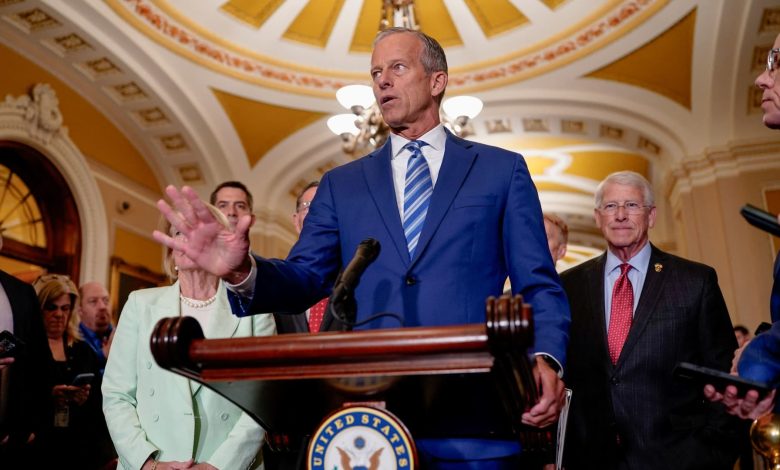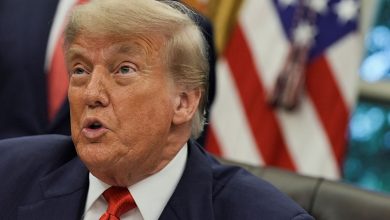What’s in the Senate’s version of Trump’s budget bill

U.S. Senate Majority Leader John Thune (R-SD) speaks at a press conference following the U.S. Senate Republicans’ weekly policy luncheon on Capitol Hill in Washington, D.C., U.S., June 10, 2025.
Kent Nishimura | Reuters
After weeks of sparring over the specifics of the “one big, beautiful bill,” the package is poised to soon head to the Senate floor, where lawmakers are pushing to get it across the finish line and on President Donald Trump’s desk before July 4.
Questions remain over whether the House will ultimately accept the Senate version of the bill, which was finalized just before midnight on Friday, as 11th-hour changes brought victories — and some losses — for lawmakers, businesses and special interest groups. The changes underscored the behind-the-scenes jockeying that went on to get the 940-page bill finished.
One major sticking point for fiscal hawks is the megabill’s proposed $5 trillion debt ceiling increase, a figure some Senate Republicans continue to bristle at, raising questions about Senate Majority Leader John Thune’s ability to align his chamber.
Thune has said he wants to bring the bill to the floor for a key procedural vote as soon as Saturday afternoon, while acknowledging that he may not have the votes. The uncertainty speaks to the reality of the Republicans’ razor-thin majority.
Here are some of the key elements of the Senate’s “big, beautiful bill,” and who stands to benefit from them:
Trump’s campaign promises
If enacted, the Senate bill would codify several of Trump’s campaign promises, including extensions for his 2017 tax cuts, such as lower income-tax brackets, higher standard deductions, a bigger child tax credit and other provisions.
The Senate bill also includes new policy proposals, such as tax breaks for tip income, overtime pay, auto loans and a bonus deduction for older Americans to help offset Social Security income taxes.
Notably, several of the new tax breaks are only temporary boosts from 2025 through 2028, which could impact taxpayers as early as the 2026 filing season.
An earlier Senate draft would have slashed household taxes by an average of roughly $2,600 in 2026, slightly less than the House bill, according to the Tax Policy Center. However, the organization found that the benefits from both versions would skew to upper-income families.
‘Revenge tax’
Republicans and the Treasury Department on agreed this week to scrap the so-called revenge tax provision — formally known as Section 899 — bringing a sigh of relief to investors on Wall Street who feared it could make the U.S. a less attractive place for investments.
The tax is aimed at retaliating against any countries whose taxes were deemed “discriminatory” or unfair against the U.S.
Treasury Secretary Scott Bessent said that he would roll out a “joint understanding among G7 countries that defends American interests,” as he asked Congress to remove the provision from the tax bill.
“Great concern had been expressed by Wall Street and affected stakeholders about the enactment of Section 899 and its impact on foreign investment in the United States, particularly in view of its complexity, potential scope of application and compliance obligations,” attorneys at law firm Holland & Knight said in a note of the tax, CNN reports.
‘SALT’ deduction
The Senate text also includes a tentative deal with House Republicans on the limit on the federal deduction for state and local taxes, known as SALT. Passed via Trump’s 2017 tax cuts, the $10,000 cap has been a sticking point for certain lawmakers in blue states.
Senate Republicans would raise the cap to $40,000 starting in 2025, with the phaseout beginning after $500,000 of income. Both figures would increase by 1% each year through 2029 and the cap would revert to $10,000 in 2030.
However, in a win for industry groups, the legislation would leave intact a SALT cap workaround for pass-through businesses, which allows owners to sidestep the $10,000 cap. By contrast, the House-approved bill would have ended the strategy for certain white-collar professionals.
“This is nonsensical approach to tax policy,” Chye-Ching Huang, executive director of the Tax Law Center at New York University Law, said in a tweet on Saturday.
“It preserves (and lessens) a limit on deductions for wealthy taxpayers while ignoring a loophole that allows the wealthiest of those taxpayers to avoid the limit entirely,” she said.
Medicaid
One point of contention in the package is the proposed deep cuts to Medicaid, the insurance program for low-income and disabled Americans that provides coverage for more than 70 million people.
The Senate parliamentarian nixed some Medicaid cuts late this week, but kept others, including work requirements of 80 hours a month, which could threaten millions of Americans’ ability to receive health insurance, according to the Congressional Budget Office.
Targeted carve-outs
Some lawmakers and industry groups notched last-minute wins that could benefit their state’s constituents, underscoring the negotiating that likely took place until the bitter end to sway skeptical Republicans.
For instance, a provision in the bill would raise the deduction for whale-hunting-related expenses to $50,000 from $10,000, delivering a win for Alaska Republican Sens. Lisa Murkowski and Dan Sullivan, Politico reports.
And, in a significant blow to renewable energy advocates, car manufacturers and some consumers, the Senate bill would eliminate the $7,500 tax credit on electric vehicle sales and leases on Sept. 30, moving up the timeline proposed in an earlier version of the text.



